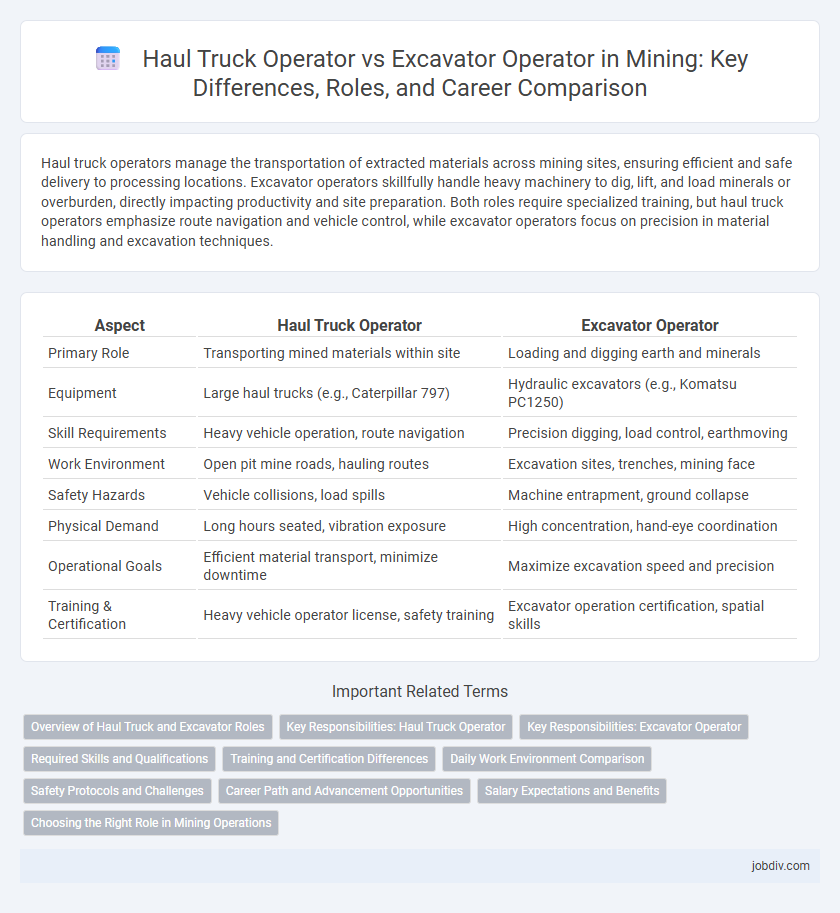Haul truck operators manage the transportation of extracted materials across mining sites, ensuring efficient and safe delivery to processing locations. Excavator operators skillfully handle heavy machinery to dig, lift, and load minerals or overburden, directly impacting productivity and site preparation. Both roles require specialized training, but haul truck operators emphasize route navigation and vehicle control, while excavator operators focus on precision in material handling and excavation techniques.
Table of Comparison
| Aspect | Haul Truck Operator | Excavator Operator |
|---|---|---|
| Primary Role | Transporting mined materials within site | Loading and digging earth and minerals |
| Equipment | Large haul trucks (e.g., Caterpillar 797) | Hydraulic excavators (e.g., Komatsu PC1250) |
| Skill Requirements | Heavy vehicle operation, route navigation | Precision digging, load control, earthmoving |
| Work Environment | Open pit mine roads, hauling routes | Excavation sites, trenches, mining face |
| Safety Hazards | Vehicle collisions, load spills | Machine entrapment, ground collapse |
| Physical Demand | Long hours seated, vibration exposure | High concentration, hand-eye coordination |
| Operational Goals | Efficient material transport, minimize downtime | Maximize excavation speed and precision |
| Training & Certification | Heavy vehicle operator license, safety training | Excavator operation certification, spatial skills |
Overview of Haul Truck and Excavator Roles
Haul truck operators are responsible for transporting large volumes of mined materials across mining sites, ensuring efficient and timely delivery to processing or dumping locations. Excavator operators handle heavy machinery designed for digging and loading earth, rock, or mineral material, playing a crucial role in material extraction and site preparation. Both positions demand specialized skills to maximize productivity and maintain safety standards within mining operations.
Key Responsibilities: Haul Truck Operator
Haul Truck Operators are responsible for transporting large volumes of ore and waste materials from the mining site to processing facilities or waste dumps, ensuring efficient and safe material movement. They operate heavy-duty haul trucks, perform pre-operational inspections, and adhere to strict safety protocols to prevent accidents and equipment damage. Maintaining communication with site supervisors and coordinating with other operators is essential for optimizing haul truck routes and minimizing downtime.
Key Responsibilities: Excavator Operator
Excavator operators in mining are primarily responsible for operating heavy machinery to dig, lift, and move large quantities of earth, minerals, and other materials efficiently. They must expertly control the excavator's arm, bucket, and other attachments to ensure precise excavation, loading, and material handling while maintaining safety standards. Skilled in equipment maintenance and site communication, excavator operators optimize productivity in surface and underground mining operations.
Required Skills and Qualifications
Haul truck operators must demonstrate strong spatial awareness, advanced vehicle control skills, and the ability to adhere to safety protocols while managing large, heavy machinery across rugged terrain. Excavator operators require precise hand-eye coordination, mechanical aptitude for equipment maintenance, and expertise in manipulating hydraulic controls to efficiently extract and load materials. Both roles demand certifications in heavy equipment operation, adherence to mining safety standards, and experience with site-specific protocols to ensure operational efficiency and safety compliance.
Training and Certification Differences
Haul truck operators require specialized training in heavy vehicle operation and safety protocols, often necessitating commercial driver's licenses and site-specific certifications to manage large payloads and navigate rugged terrain safely. Excavator operators must complete technical training programs emphasizing hydraulic machinery control, excavation techniques, and hazard recognition, with certifications such as NCCER or equivalent to ensure competence in precise digging and material handling. Differences in training curricula reflect the unique operational demands and safety risks associated with mobile haulage versus stationary excavation equipment in mining environments.
Daily Work Environment Comparison
Haul truck operators navigate expansive mining sites, managing heavy machinery across uneven terrain with constant exposure to dust, noise, and vibration, requiring strong spatial awareness and endurance. Excavator operators work in more confined, often elevated cab spaces, focusing on precision control of hydraulic systems to excavate and load materials, facing continuous visual and tactile feedback demands. Both roles demand adherence to strict safety protocols and effective communication in dynamic, high-risk environments to maintain operational efficiency and worker safety.
Safety Protocols and Challenges
Haul truck operators must rigorously adhere to safety protocols such as blind spot monitoring and strict communication with spotters to prevent collisions in high-traffic zones. Excavator operators face challenges like maintaining stability on uneven terrain and managing swing radius hazards, requiring constant vigilance and precise control. Both roles demand comprehensive training in hazard identification and emergency response to mitigate risks associated with heavy equipment operation.
Career Path and Advancement Opportunities
Haul truck operators typically start in entry-level positions, progressing to senior operator roles or supervisory jobs overseeing mining logistics and fleet management. Excavator operators have career advancement paths leading to specialized equipment operator trainer positions or mining site safety coordinators, leveraging their expertise in heavy machinery operation. Both roles offer opportunities to transition into equipment maintenance supervision or mine planning through additional certifications and experience.
Salary Expectations and Benefits
Haul truck operators in mining typically earn an average annual salary of $70,000 to $90,000, reflecting the high demand for skilled heavy vehicle operators and often include benefits like health insurance, retirement plans, and overtime pay. Excavator operators generally command a slightly higher salary range of $75,000 to $95,000, driven by the technical expertise required to operate complex machinery, with comparable benefits packages including safety bonuses and paid training. Both roles benefit from job stability and opportunities for overtime, but excavator operators may receive additional compensation for specialized skills and certifications.
Choosing the Right Role in Mining Operations
Haul Truck Operators are essential for transporting large volumes of mined materials efficiently, requiring strong coordination skills and familiarity with heavy vehicle operation. Excavator Operators excel in precisely digging and loading materials, demanding expertise in hydraulic machinery and spatial awareness. Selecting the right role depends on operational needs, equipment specialization, and personal strengths in either vehicle navigation or mechanical excavation.
Haul Truck Operator vs Excavator Operator Infographic

 jobdiv.com
jobdiv.com